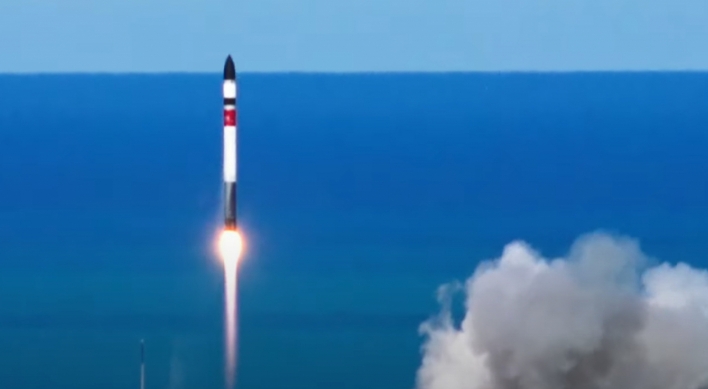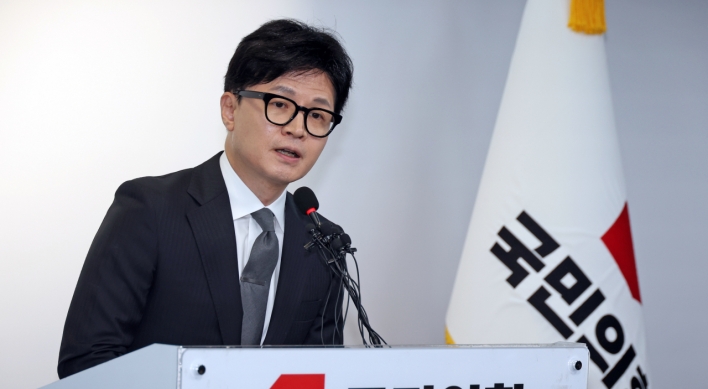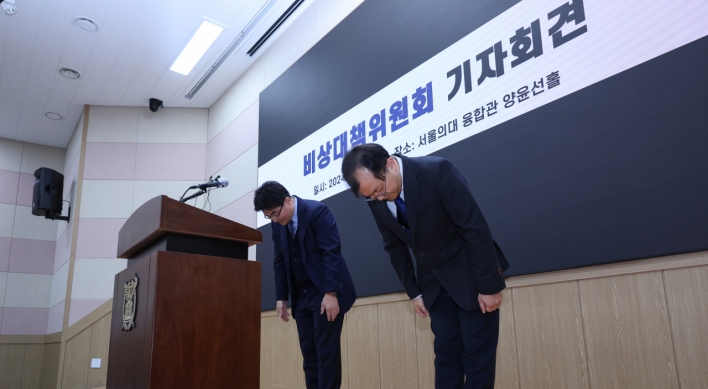[Editorial] More active role
China should engage more in global efforts to denuclearize the North
By Korea HeraldPublished : July 7, 2017 - 17:41
President Moon Jae-in held his first summit with Chinese President Xi Jinping in Berlin, Germany, Thursday.
At the meeting with Xi, Moon recognized China’s contributions to global efforts to resolve North Korea’s nuclear and missile threat, and demanded the country do more. But he failed to get Xi’s consent.
Xi reportedly said, “China has a blood alliance with North Korea. It has kept diplomatic relations with South Korea for 25 years.
“Many changes have happened, but the basic relationship does not change.”
This suggests even if the North launched an intercontinental ballistic missile, which is a provocation deemed as a game changer, Beijing will do little to hurt their alliance.
Xi also said the North’s nukes are not a matter between South and North Korea, and asked back, “Isn’t it right to view it as a matter between the North and the US?
This does not differ from Pyongyang’s argument. It is doubtful whether China truly has the will to resolve the North Korea problem.
Xi held summit talks with Russian President Vladimir Putin on Tuesday.
Their joint statement after the talks denounced the North for violating UN resolutions, but suggested the perennial road map, urging a simultaneous freeze of the North’s nuclear and missile tests and the Korea-US joint military exercise.
Each time the North tested atomic bombs or missiles, China has called for restraint and dialogue. It has blamed both the North and the US.
Xi said in his summit talks with Moon, “China has made sufficient efforts, so I cannot accept the international community’s criticism of the lack of China’s efforts.”
In recent months when the missile crisis escalated, Beijing vowed several times to carry out UN sanctions faithfully, but it does not seem to have kept its words. It says it has done all it can do, and now it is up to the US to resolve the North Korea threat.
The reclusive regime will keep testing nukes and missiles if China keeps blaming both North Korea and the US, showing compassion to Pyongyang and avoiding effective pressure on the North, such as the suspension of oil supply and forced repatriation of North Korean workers.
The security crisis and instability on the Korean Peninsula cannot but rise. This will eventually have an adverse impact on China and its people.
Continued hesitance to put stronger pressure on the North can be seen as abetting its nuclear and missile development. It will likely lead to tension and confrontation with the US over the North Korea issue.
If China does little to curb escalating North Korean threats, the likelihood of unilateral US actions will go up.
US Ambassador to the UN Nikki Haley said, “One of our capabilities lies with our considerable military forces. We will use them if we must.”
Recent US sanctions on China’s Bank of Dandong for aiding North Korea reflect Washington’s distrust of Beijing’s sanctions on the North.
In talks with Moon, Xi said he opposes the deployment of the Terminal High Altitude Area Defense anti-missile system, asking the South to “take heed of China’s justifiable worry.”
The system is a defense weapon against North Korean missile attacks, but China will not listen. Even though the North has kept strengthening its nuclear and missile capabilities, Xi has reiterated his position to oppose the system. Beijing needs to take heed of Seoul’s worries, too.
China should know that it bears much of the responsibility for North Korea’s nuclear and missile provocations even under toughening sanctions.
China gets the North Korean economy moving by supplying about 500,000 tons of crude oil each year, importing its minerals, and allowing contraband trade across the border.
By firing off an ICBM, the North may be near the red line or may have already crossed it.
Its nukes and missile development should be stopped and scrapped for peace and stability on the Korean Peninsula.
Now is the time for China to play a more active role in pressuring the North to halt its provocations and sit at the table for denuclearization dialogue.
At the meeting with Xi, Moon recognized China’s contributions to global efforts to resolve North Korea’s nuclear and missile threat, and demanded the country do more. But he failed to get Xi’s consent.
Xi reportedly said, “China has a blood alliance with North Korea. It has kept diplomatic relations with South Korea for 25 years.
“Many changes have happened, but the basic relationship does not change.”
This suggests even if the North launched an intercontinental ballistic missile, which is a provocation deemed as a game changer, Beijing will do little to hurt their alliance.
Xi also said the North’s nukes are not a matter between South and North Korea, and asked back, “Isn’t it right to view it as a matter between the North and the US?
This does not differ from Pyongyang’s argument. It is doubtful whether China truly has the will to resolve the North Korea problem.
Xi held summit talks with Russian President Vladimir Putin on Tuesday.
Their joint statement after the talks denounced the North for violating UN resolutions, but suggested the perennial road map, urging a simultaneous freeze of the North’s nuclear and missile tests and the Korea-US joint military exercise.
Each time the North tested atomic bombs or missiles, China has called for restraint and dialogue. It has blamed both the North and the US.
Xi said in his summit talks with Moon, “China has made sufficient efforts, so I cannot accept the international community’s criticism of the lack of China’s efforts.”
In recent months when the missile crisis escalated, Beijing vowed several times to carry out UN sanctions faithfully, but it does not seem to have kept its words. It says it has done all it can do, and now it is up to the US to resolve the North Korea threat.
The reclusive regime will keep testing nukes and missiles if China keeps blaming both North Korea and the US, showing compassion to Pyongyang and avoiding effective pressure on the North, such as the suspension of oil supply and forced repatriation of North Korean workers.
The security crisis and instability on the Korean Peninsula cannot but rise. This will eventually have an adverse impact on China and its people.
Continued hesitance to put stronger pressure on the North can be seen as abetting its nuclear and missile development. It will likely lead to tension and confrontation with the US over the North Korea issue.
If China does little to curb escalating North Korean threats, the likelihood of unilateral US actions will go up.
US Ambassador to the UN Nikki Haley said, “One of our capabilities lies with our considerable military forces. We will use them if we must.”
Recent US sanctions on China’s Bank of Dandong for aiding North Korea reflect Washington’s distrust of Beijing’s sanctions on the North.
In talks with Moon, Xi said he opposes the deployment of the Terminal High Altitude Area Defense anti-missile system, asking the South to “take heed of China’s justifiable worry.”
The system is a defense weapon against North Korean missile attacks, but China will not listen. Even though the North has kept strengthening its nuclear and missile capabilities, Xi has reiterated his position to oppose the system. Beijing needs to take heed of Seoul’s worries, too.
China should know that it bears much of the responsibility for North Korea’s nuclear and missile provocations even under toughening sanctions.
China gets the North Korean economy moving by supplying about 500,000 tons of crude oil each year, importing its minerals, and allowing contraband trade across the border.
By firing off an ICBM, the North may be near the red line or may have already crossed it.
Its nukes and missile development should be stopped and scrapped for peace and stability on the Korean Peninsula.
Now is the time for China to play a more active role in pressuring the North to halt its provocations and sit at the table for denuclearization dialogue.
-
Articles by Korea Herald



![[Exclusive] Korean military set to ban iPhones over 'security' concerns](http://res.heraldm.com/phpwas/restmb_idxmake.php?idx=644&simg=/content/image/2024/04/23/20240423050599_0.jpg&u=20240423183955)
![[AtoZ into Korean mind] Humor in Korea: Navigating the line between what's funny and not](http://res.heraldm.com/phpwas/restmb_idxmake.php?idx=644&simg=/content/image/2024/04/22/20240422050642_0.jpg&u=)

![[Graphic News] 77% of young Koreans still financially dependent](http://res.heraldm.com/phpwas/restmb_idxmake.php?idx=644&simg=/content/image/2024/04/22/20240422050762_0.gif&u=)




![[Pressure points] Leggings in public: Fashion statement or social faux pas?](http://res.heraldm.com/phpwas/restmb_idxmake.php?idx=644&simg=/content/image/2024/04/23/20240423050669_0.jpg&u=)








